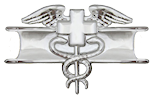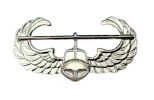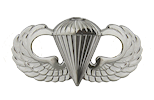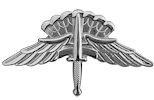Infantry School: Difference between revisions
StetchkovA (talk | contribs) |
StetchkovA (talk | contribs) |
||
| Line 117: | Line 117: | ||
===Pre-Requisite Exemption=== | ===Pre-Requisite Exemption=== | ||
Troopers currently assigned to a weapons Squad (4/2/B/1-7, 4/1/C/1-7, 4/2/C/1-7) are exempt from ALL prerequisite courses. | |||
{| class="wikitable" style="width: 604px;" | {| class="wikitable" style="width: 604px;" | ||
Revision as of 10:59, 22 March 2024

Introduction
The Infantry School (IS) is a 1st Battalion (Arma 3) School operated as part of S7 - Training. The school is officially known as the "Arma 3 Infantry School". The Arma 3 Infantry School instructs Soldiers on all aspects of Infantry, Medical, and tactical Signal operations. The School is designated the Functional Center of Excellence (FCoE) for all Infantry, Infantry leadership, Heavy Weapons, Medical, and Soldier-level Signal training. Instructors teach the newest Troopers on basics such as Land Navigation, up to and including advanced Leadership and tactics courses. The Arma 3 Infantry School was re-designated from the School of Infantry to reflect connections with the real United States Army Infantry School.
Mission and Vision
The Mission of the Arma 3 Infantry School is listed as: The Arma 3 Infantry School will train, develop and mentor the next generation of the Cavalry's direct combat soldiers- Infantrymen. It will train Infantry Troopers to operate in the most austere conditions, including degraded communications, with a strong emphasis on mission command and initiative. It will develop Soldiers into warriors who can operate within their commander's intent to create devastating effects on the enemy by closing with, and then destroying them. The Arma 3 Infantry School provides fundamental baseline training for all Troopers to become effective and lethal warriors. The Vision of the School is listed as: The Arma 3 Infantry School is designated the Functional Center of Excellence (FCoE) for Infantry, Combined Arms, Medical, and Signal operations. The School strives to maintain a global outlook, to understand and assess the capabilities of adversarial and friendly infantry weapon systems, doctrine, and training. The School imparts upon the newest Troopers the fundamental skills, to move, shoot, and communicate. The School develops dismounted capabilities from fundamentals to advanced leadership and specialty skill training. The instructors of the Arma 3 Infantry School are proud infantrymen who have extensive operational experience, who use real-word knowledge to enhance the training experience of their Troopers.
Order of Battle
The Arma 3 Infantry School has five distinct sections.
| Section | Description | Courses Offered |
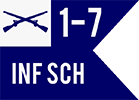
|
The Arma 3 Infantry School Headquarters Section consists of the School Commander, who is responsible for command of the School, and to ensure training is delivered to a high standard. | N/A |
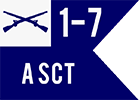
|
A (Foundation Training) Section delivers basic courses to the Regiment's newest soldiers, allowing them to operate as trained and effective basic Troopers. |
|
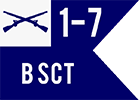
|
B (Infantry Skills Training) Section delivers individual training to members of the Combined Arms Battalion related to all infantry courses. |
|

|
C (Medical Training) Section delivers individual Health Service Support training through the delivery of medical training courses. |
|

|
D (Airborne Training) Section delivers Airborne and Air Assault training to members of the Combined Arms Battalion to ensure trained and ready Troopers for full Spectrum Air Assault and Airborne Operations. |
|
Foundation Training Courses
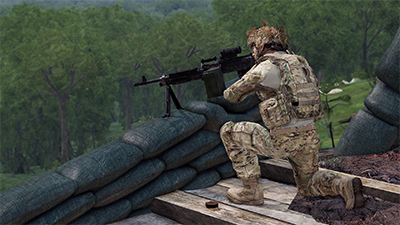
The Arma 3 Infantry School A Section (Foundation Training) delivers three basic level courses, designed to ensure Soldiers who enter the Regiment are prepared to act in a basic capability in any Military Occupational Specialty.
The Basic Land Navigation Course (BLN) is designed to teach new Soldiers in the Regiment all aspects of navigation without GPS aid. The course teaches students how to read tactical maps, including terrain features, symbols, and colors. It also trains Students on the use of a map protractor, and compass. Students apply navigation principles in a practical environment. The course is 2.5 hours, delivered in one day. Because this is a basic level course, there are no pre-requisites.
Basic Individual Training (BIT)
The Basic Individual Training Course (BIT) is an entry-level course designed to teach new Soldiers the basics of dismounted fire, movement, and communication. Soldiers are taught basic formations, and movement within an Infantry Squad and Fireteam. Students also learn basic reports, fire commands, and then execute basic battle drills. Students apply all concepts in a live-fire Field Training Exercise (FTX) including react to contact. The course is 2.5 hours long, delivered in one day. Because this is a basic level course, there are no pre-requisites.
Basic Radio Communications Course (BRCC)
The Basic Radio Communication Course (BRCC) is an entry level course that trains Soldiers to act as communicators using a variety of soldier-level tactical communications systems. Soldiers are taught how to program and operate the AN/PRC-343 "Personal Role Radio", AN/PRC-152 and AN/PRC-117F VHF radios. Soldiers learn the principles of radio communication, such as brevity, clarity, and accuracy. Soldiers also learn reports and returns such as SITREPs, SPOTREPs, and contact reports. The course concludes with a practical portion. The course is 2 hours long, delivered in one day. Because this is a basic level course, there are no pre-requisites.
Infantry Skills Training
The Arma 3 Infantry School B Section (Infantry Skills Training) delivers all MOS centric infantry courses, and is the primary Section within the School.
Advanced Individual Training (AIT)
Advanced Individual Training (AIT) is designed to train Infantry Soldiers on all roles within the Infantry Rifle Squad. Students are primarily 11B Infantrymen, although all MOS's are permitted to attend. The course begins by discussing all roles within the Infantry Rifle Squad. Students then learn about the various forms of the Squad Hasty Attack, on various types of enemy targets. The course concludes with a Live Fire Field Training Exercise against a simulated enemy, where the Rifle Squad conducts hasty attacks. The course is 3 hours long, delivered in one day.
| Pre-Requisites |
| Basic Land Navigation |
| Basic Individual Training |
| Basic Radio Communication Course |
Basic Leader Course (BLC)
The Basic Leader Coure (BLC) trains Infantry soldiers to act as Fireteam Leaders as part of an Infantry Rifle Squad. Students learn the basics of planning considerations (METT-TC), and principles of leadership. Students then practice moving their Fireteam through the battlespace, followed by the execution of Squad Fire Commands. Once this is completed, Students execute live-fire React to Contact Drills and Hasty Attacks, as Fireteam Leaders and members. The course takes 3 hours, and is delivered over one day.
| Pre-Requisites |
| Basic Land Navigation |
| Basic Individual Training |
| Basic Radio Communication Course |
| Advanced Individual Training |
Advanced Leader Course (ALC)
The Advanced Leader Course (ALC) trains Infantry soldiers to act as Infantry Rifle Squad Leaders as part of an Infantry Rifle Squad. Students learn about further Infantry leadership. They also learn about planning and executing dismounted movement, including route planning. They learn how to utilize Blue-Positional Awareness systems, such as Blue Force Tracker (BFT). Students also learn how to command and execute all Infantry Battle Drills as a Rifle Squad Leader. The course has a significant practical portion, with students acting as Rifle Squad Leaders, conducting dismounted movement, briefings, and planning and executing a Squad level attack. The course takes 3 hours, and is delivered in one day.
| Pre-Requisites |
| Basic Land Navigation |
| Basic Individual Training |
| Basic Radio Communication Course |
| Advanced Individual Training |
| Basic Leader Course |
Infantry Heavy Weapons Course (IHW)
The Infantry Heavy Weapons Course (IHW) trains Infantry soldiers to perform the duties of an Infantry soldier assigned to an Infantry Weapons Squad. Students learn the principles of machine-gun fire such as beaten zones, fire commands, and roles in an Infantry Weapons Squad. Students also learn how to adjust direct fires at long range. Students have a large amount of practical application with Infantry Support Weapons. Students learn how to operate, fire, and characteristics of the M2 Heavy Machine Gun, the Mk. 19 Grenade Machinegun, BGM-71 TOW Anti-Tank Missile Launcher, and FGM-148 Javelin Anti-Tank Missile Launcher. The course takes 150 minutes, delivered in one day.
Pre-Requisite Exemption
Troopers currently assigned to a weapons Squad (4/2/B/1-7, 4/1/C/1-7, 4/2/C/1-7) are exempt from ALL prerequisite courses.
| Pre-Requisites |
| Basic Land Navigation |
| Basic Individual Training |
| Basic Radio Communication Course |
| Advanced Individual Training |
Ranger School (RNGR)
Ranger School (RNGR) is the capstone level Infantry course offered by the Arma 3 Infantry School. The course is a leadership course that tests students mastery of all light infantry concepts. The course evaluates students on use of all infantry personal and crew-served weapons, land navigation, radio communications, combat-first aid, and leadership. The course is delivered over a 2-day period. Day One evaluates students ability to conduct dismounted land navigation without a GPS, and fire their M4A1 Carbine to an expert level. If students successfully complete Day One, they proceed to Day Two. During this phase, students execute infantry Squad missions in all roles, including as commanders. Their leadership, decision making, infantry knowledge and performance under stress are all evaluated. Successful students are authorized to wear the Ranger tab on their uniforms. The course takes 6 hours, with 3 hours per day.
| Pre-Requisites |
| Basic Land Navigation |
| Basic Individual Training |
| Basic Radio Communication Course |
| Advanced Individual Training |
| Basic Leader Course |
| Advanced Leader Course |
| Infantry Heavy Weapons Course |
| Basic Air Assault Course |
| Basic Airborne Course |
| Jumpmaster Course |
| Military Freefall Parachutist Course |
Medical Training
The Arma 3 Infantry School C Section (Medical Training) delivers all MOS centric medical courses, and conducts basic Combat Lifesaver training for all members of the Combined Arms Battalion. All medical courses are open to all MOS, however.
Combat Life Saver Course (CLS)
The Combat Life Saver Course (CLS) instructs Soldiers from all MOS the basics to prevent loss of life in the Arma 3 environment. The course has a significant classroom portion, where students learn the role of the CLS, levels of care, and CASEVAC/MEDEVAC procedures. Students learn about basic medical equipment, and principles to lifesaving care, known as F.A.I.R. Students then practice applying the F.A.I.R. (Find, Assess, Intervene, Re-Assess) process on simulated casualties. The course is 2 hours long, delivered in one day.
| Pre-Requisites |
| Basic Land Navigation |
| Basic Individual Training |
| Basic Radio Communication Course |
Pre-Requisite Exemption
68W MOS Soldiers applying to CLS are exempt from the following pre-requisite courses:
| Pre-Requisite Exemptions |
| Basic Land Navigation |
| Basic Individual Training |
| Basic Radio Communication Course |
Combat Medic Course (CMC)
The Combat Medic Course (CMC) teaches Soldiers to act as a Platoon Medic to deliver lifesaving care to members of the Combined Arms Battalion. Students learn the specific equipment issued to Combat Medics, how to re-supply medical stores, and specific duties of the Combat Medic. Students then practice the application of the F.A.I.R. principle, in both simulated and live-fire field training exercise. The course is 180 minutes long, delivered in one day.
| Pre-Requisites |
| Basic Land Navigation |
| Basic Individual Training |
| Basic Radio Communication Course |
| Combat Lifesaver Course |
| Advanced Individual Training |
Advanced Care Course (ACC)
The Advanced Care Course (ACC) teaches Soldiers to act as a commander or member of a Mobile Medical Team. Students learn how to conduct MEDEVAC, the principles, and methods thereof. Students also learn about advanced care equipment, followed by a series of demanding practical examinations. The course is 180 minutes long, delivered in one day.
| Pre-Requisites |
| Basic Land Navigation |
| Basic Individual Training |
| Basic Radio Communication Course |
| Combat Lifesaver Course |
| Combat Medic Course |
| Advanced Individual Training |
Battlefield Pharmacology Course
The Battlefield Pharmacology Course is focused on exposing troopers to the medications and procedures they might encounter while operating as a Combat Medic within an operation. The class is up to 90 minutes (1 1/2 hours) long. There is a classroom portion followed by practice scenarios.
| Pre-Requisites |
| Basic Individual Training |
| Basic Radio Communication Course |
| Basic Land Navigation |
| Advanced Individual Training |
| Combat Lifesaver Course |
Airborne Training
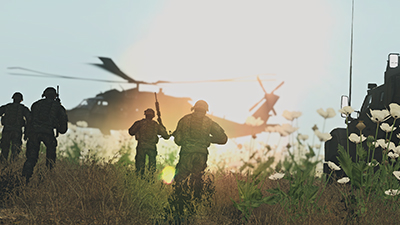
The Arma 3 Infantry School D Section (Airborne Training) delivers Airborne and Air Assault training to members of the Combined Arms Battalion to ensure trained and ready Troopers for full Spectrum Air Assault and Airborne Operations.
Basic Airborne Course (BAC)
The Basic Airborne Course, commonly known as Airborne School or Jump School is a foundational class training Soldiers on the operation of the T-10 and T-11 Parachute in static line operations. Soldiers are trained on the basic commands for drills inside the aircraft, procedures for exiting, and actions on landing, including obstacles and hazards. Students execute jumps primarily from the C-130J Hercules Transport Aircraft, but may also jump from the CH-46 or UH-60 Helicopter. Troopers practice these skills in day and night evolutions, including a Field-Training exercise simulating combat once a Paratrooper lands. The course is 2 hours long, conducted in one day. Students who successfully complete BAC are awarded the Army Parachutist Badge.
| Pre-Requisites |
| Basic Land Navigation |
| Basic Individual Training |
| Basic Radio Communication Course |
Pre-Requisite Exemption
11B MOS Soldiers in Charlie Company applying to BAC are exempt from the following pre-requisite courses:
| Pre-Requisite Exemptions |
| Basic Land Navigation |
| Basic Individual Training |
| Basic Radio Communication Course |
Basic Air Assault Course (BAAC)
The Basic Air Assault course, commonly known as Air Assault, or Air Assault School is a foundational level class training Soldiers on the application of Air Assault tactics for use as part of an Air Assault Task Force (AATF). Soldiers are trained on commands used for boarding, and disembarking a helicopter. Students also learn the different techniques for dismounting, including formations. The course focuses on practical application, including a Field-Training Exercise simulating an Air Assault mission. The course is 2 hours long, conducted in one day. Students who successfully complete BAAC are awarded the Air Assault Badge.
| Pre-Requisites |
| Basic Land Navigation |
| Basic Individual Training |
| Basic Radio Communication Course |
Pre-Requisite Exemption
11B MOS Soldiers in Charlie Company applying to BAAC are exempt from the following pre-requisite courses:
| Pre-Requisite Exemptions |
| Basic Land Navigation |
| Basic Individual Training |
| Basic Radio Communication Course |
Jump Master Course (JMC)
The Jump Master Course, also known as Jump Master School or JM School is an advanced leadership course conducted by The Airborne School to qualify Army leaders as Jump Masters, and Drop-Zone safety officers in support of Airborne operations. Students learn how to properly site, mark, and control a Drop-Zone. Students also learn how to give briefs related to Airborne operations. The course is 2 hours long, conducted over 1 day. Soldiers who successfully qualify as Jump Masters are authorized to wear the Senior Army Parachutist Badge.
| Pre-Requisites |
| Basic Land Navigation |
| Basic Individual Training |
| Basic Radio Communication Course |
| Advanced Individual Training |
| Basic Leader Course |
| Basic Airborne Course |
Military Freefall Parachutist Course (MFFP)
The Military Freefall Parachutist Course (MFFP), commonly known as "Free-Fall" or "HALO", is a specialized course that instructs experienced Army Parachutists to conduct High Altitude, Low Opening (HALO), and High Altitude, High Opening (HAHO) parachute operations. Students for MFFP are commonly Jump Masters, Reconnaissance Soldiers or members who have completed Ranger School. Similar to BAC, students learn the basic commands associated with free-fall parachuting. They also learn about the equipment required, and how to designate release points for HALO or HAHO operations. The course takes 2 hours, and is delivered in 1 day. Students who successfully complete MFFP are awarded the Military Freefall Parachutist Badge.
| Pre-Requisites |
| Basic Land Navigation |
| Basic Individual Training |
| Basic Radio Communication Course |
| Advanced Individual Training |
| Basic Leader Course |
| Basic Airborne Course |
| Jumpmaster Course |
Awards and Decorations
The Arma 3 Infantry School awards a number of unique badges and devices.
Course Request Form
If a soldier requires a course at a specific time or date, they may submit a request to the Infantry School at the following link:
| https://docs.google.com/forms/d/e/1FAIpQLSebcAJNRrLTd30nnaZn20EKhq-OzARHLxKmPc_vVHn7MUJqCg/viewform |
School Standard Operating Procedures
Instructor Qualification Policy
All new instructors to the school will start as assistant instructors - that is to assist others in the running of their courses. To become qualified as a full instructor and run their own courses the instructor must do the following:
- Be qualified in the class prior as a student.
- Attend one course as an assistant instructor.
- Teach the course as a lead instructor under the supervision of a fully qualified instructor
- Be added to the Infantry School qualification tracker
Guidance to Instructors
Instructors already qualified must remain current with the material and assist other instructors as required. They must remain proficient with the tools of administrating a course, namely posting and scheduling classes, posting the graduation work and recommending medals for courses that award any badge or award. Instructors should take the time to develop instructors in training, allowing them to conduct the necessary administration as training as part of the qualification process. Instructors should refer to this document for any future queries.
Guidance to Infantry School Commander
The IS Commander must audit classes whenever possible to ensure the Infantry School standard is maintained.
Assigning a new Fully Qualified Instructor to a course
The IS Commander is responsible for evaluating and passing Instructors in Training. Once the Instructor in Training has displayed the ability to lead that course effectively, the Commander will:
- Ensuring that the Instructor in Training is familiar with the correct graduation post and forum post formats and locations.
- Verify the Instructor in Training shows effective leadership
- Inform the Instructor in Training that they are now a fully qualified instructor.
New Instructor In-Clearance Routines
The Lead Instructor will:
- Conduct an in-person Initial Counselling Statement (ICS), and discuss:
- Minimum requirement of attending one course per month
- Discuss instructor interests to assign the correct section
- Explain the process to becoming fully qualified
- Review the S7 Wiki Page, as well your school’s Wiki page
- Review relevant information and S7 SOP’s with them
- Encourage the new Instructor to bookmark this information
- Explain the course scheduling policies
- Review the Regimental Calendar app
- Review the S7 Department - Class Posting SOP
- Review how to post a graduation announcement
- Add the Instructor to your school’s S7 Tracker
- Add the Instructor to your school’s S7 Google Drive with “Viewer” access
- Review your S7 Google Drive with the Instructor so they can find Lesson Plans
- Let the new Instructor know to look through the S7 Forums after S1 process their position announcement
- Encourage the new Instructor to bookmark and review the S7 Forums once available
- Create a new position assignment in the Position Announcements forum
